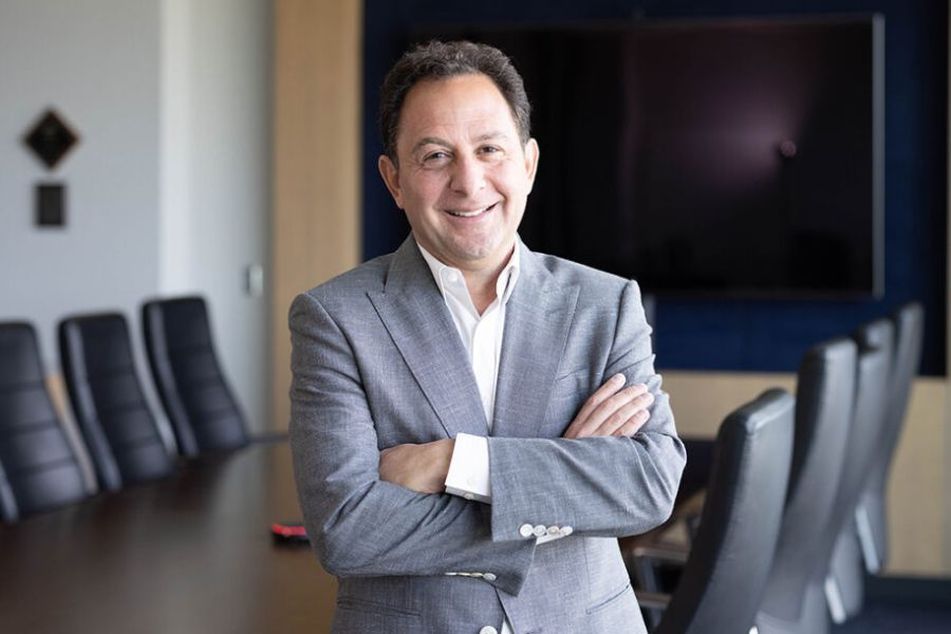Focus on What Matters with Peter Mallouk
Do you focus on what matters, or what seems urgent? Peter Mallouk talks about the value of taking a simplified approach to your finances!
Listen to us On
About the Episode
We focused on how to focus on what matters when it comes to your money, the impact of AI on financial advice, balancing short and long-term needs and desires, advice to young people and grownups alike, the power of inertia, and the value of simplicity, with Peter Mallouk, President and CEO of Creative Planning.
Listen to hear a difference-making tip on how to set yourself up for long-term financial success!
Get your copy of Money Simplified here:
You can learn more about Peter at CreativePlanning.com, Facebook, X, Instagram, YouTube, and LinkedIn.
Did you get anything out of this episode? Do us a solid and leave a review:
https://ratethispodcast.com/alignedmoneyshow
Learn more and engage at MoneyAlignmentAcademy.com, Twitter, LinkedIn, Instagram, YouTube and Facebook.
Buy George G a coffee (he loves coffee)
https://www.buymeacoffee.com/lifeblood
Have George G speak
https://moneyalignmentacademy.com/speaking/
Financial literacy and wellness for individuals, families, and companies
https://moneyalignmentacademy.com/
Find George G’s books here
The Aligned Money Show is the podcast for Money Alignment Academy, copyright 2024.

George Grombacher
Host

Peter Mallouk
Guest
Episode Transcript
george grombacher 0:02
theater to get us started. Give me two truths and a lie, please. All
Peter Mallouk 0:06
right in the past year, I have seen the weekend and concert. I have seen Morgan Wallen concert. And I’ve seen Taylor Swift in concert.
george grombacher 0:16
Oh, my goodness. Those are excellent. Difficult. Okay, I know you’ve got three kids, but I don’t know if you have sons or daughters or if that plays into this at all. I am going to say that you’ve not seen the weekend.
Peter Mallouk 0:33
You are correct. I’ve seen him but not in the past year. So Damn, that’s impressive. All right. All
george grombacher 0:39
right. So what was what was the context of Taylor Swift as a phenomenon, as all of these artists are? How was I’ve taken
Peter Mallouk 0:46
that. So I went to the weekend with my oldest but that was a couple years ago. And so you got it right. And then all of them went to Morgan Wallen. I’ve taken my daughter to every Taylor Swift tour going back to 15 years ago, when she did her first tour, and no one knew who she was. And some guy on a guitar was opening for her. It turns out that was Ed Sheeran. And just like way, way back when, when my daughter was very little, and so we’ve not missed a tour yet. So we just kept the street going.
george grombacher 1:11
Amazing. And other getting better and better.
Peter Mallouk 1:15
I think without exaggeration, the greatest singer, singer songwriter of this century so far, okay,
george grombacher 1:20
well, they’re that good. eautiful. All right, well, those are solid, nothing better than live music. Aside from that, what’s top of mind for you right now, Peter?
Peter Mallouk 1:31
Well, I think a lot about the markets and everything going on in the world, just like our clients do. And I think you know, we’re in a perfect, we’re in the perfect storm of all the stuff that freaks everybody out, but doesn’t really matter to a long term investor. You know, war in Ukraine war in the Middle East, either of those have a recipe you can see it in a history book, going from a small one, not a small, but like a local war to a regional bar to a World War, you see an election, we have probably one of the most contentious in a long time coming up with people with different very, very different points of views about the world of all this interest rate trouble, you have inflation and the immigration issue, all of these things have real economic impact. But for the long term investor, you know, these are not big factors. The big factor is our innovation, technology, you know, people emerging out of poverty over the next decade. And so it’s really just keeping the eye on the ball, you know, helping long term investors keep their eye on the ball, keep their eye on the prize. Amen.
Unknown Speaker 2:31
It’s not easy, though.
Peter Mallouk 2:33
No, it’s, it’s like, there’s just always something and if you can just go back, you know, 100 years, I mean, just a man. I mean, people like, Oh, this is the craziest time to be alive, really worse than the Spanish flu and the World Wars. I mean, in the Great Depression, I mean, you know, these are, things are not perfect. But it’s certainly much better than I’d say, 95% of all points in history.
george grombacher 2:57
One of my favorite quotes, and I don’t know if it’s Buddha, or Jack Kornfield says, tend to the parts of your garden that you can touch.
Peter Mallouk 3:04
Oh, I like that. I have not heard that. That’s, that’s good. You know,
george grombacher 3:09
we’ve pulled in so many directions. And surprise is such a powerful emotion. So when I read a headline, I’m like, Oh, my gosh, that’s happening right now. And I get sucked in. But it doesn’t necessarily. It’s not that it doesn’t matter. But it doesn’t necessarily matter as a long term investor. Right?
Peter Mallouk 3:23
I don’t know that it makes a lot of sense to be emotionally expended on it, or to make investment decisions based upon it for sure.
george grombacher 3:31
So here, here we are, we are at this point, I don’t know if it’s disruption we’ve got technology is always advancing and artificial intelligence in you, obviously, head up this massive financial firm that’s helping so many different people in managing so much money. How are you thinking about AI?
Peter Mallouk 3:52
I think AI is going to change everything. I think it’s impossible for us to overstate how incredible it’s going to be how much it will influence all of our lives. It’s like the first day the Internet came out. You know, people thought it would be big, but no one could appreciate this is that times I think 100 I think 1000 2000 years from now, if the Earth is still spinning, and that’s a big if, but if the Earth is still spinning, and there are people on it, and there are history books, you know, there’ll be, you know, seven, eight key points in history of the evolution of mankind, they’re gonna point right to right now, as one of those times we are living in one of those times, where we’re gonna see advances with technology and healthcare and quality of life that are unimaginable to us and it’s an exciting time to be alive.
george grombacher 4:36
And how it pertains to financial the the delivery or just how is it going to impact the work of professional advisors?
Peter Mallouk 4:46
Well, I think first a lot of people think well AI is going to come take my job but if you look throughout history, you know you get the car and then you get you get planes and you get printing and you get the internet and and blockbuster takes up the mom and pop shop. And then Netflix takes up blockbuster. But you know, what happens is unemployment has gone down. We’ve just moved from really tough jobs to much easier. Jobs used to be one and two of us was a farmer not that long ago, and one of the four was in manufacturing. Now, a very tiny percentage are in farming and manufacturing, but unemployment is lower. And so I think AI really improves the quality of life for everybody. I think it will like the internet and technology, make advisors more efficient, one adviser will be able to do a lot more, which means it’ll be able to drive more value to the client for the same fee or lower their fee, ultimately,
george grombacher 5:36
the Ark of farmers, one in two of us was a farmer back in the day.
Peter Mallouk 5:42
That’s right. That’s right. And it wasn’t long ago.
george grombacher 5:46
What a wonderful way to illustrate that.
Peter Mallouk 5:49
And what’s crazy, is the couple of percent of people that still are from farmers are doing output, many times more than half the population was doing at one point. So the power of technology.
george grombacher 6:04
Is there anything about it that you’re nervous or uncomfortable about?
Peter Mallouk 6:09
Oh, 100% I think the people that are fear fearing a surveillance society, I don’t think that’s crazy, conspiratorial stuff, that’s where we’re heading. You know, everything you do, a computer or some technology is going to know what you’re doing all the time. So you can put a positive spin on that as you want. Like somebody mugged somebody, somewhere there is zero chance they’re getting away from getting away with it. We’ll go 1020 years out. But also like this any sense of privacy you had Forget it, you may as well have a chip in your hand, the way everyone’s going to know everything that’s happening all the time in the not too distant future.
george grombacher 6:45
That doesn’t sound awesome.
Peter Mallouk 6:47
No, it does. That bar does not sound awesome. But if you get sick, and all of a sudden, you get a course of treatment that you would not have had and you get to live 12 years longer. I mean, there’s there’s a lot of pros and there are going to be cons. Yeah.
george grombacher 7:01
The academies and double edged swords, and Yin, Yin and Yang and all this stuff. Peter is right. But you’re positive about the future. Very,
Peter Mallouk 7:09
very positive. I think if you look in history, whenever you see demographics improving, and we’ve got over a billion people coming out of poverty in the next decade, and you see advancements in technology. And I think we’re on the cusp of the greatest technological innovation mankind has ever seen. When you see those two things together, you see economic expansion and quality of life improve. It’s not linear, doesn’t mean next year will be better than this year. But it definitely means that it’ll be better a decade from now than today. So it’s very friendly for investors, long term investors.
george grombacher 7:40
So I wanted to ask about, I saw that you just recently did maybe it was even today, you talked to young people. What What message do you share with with young people about money?
Peter Mallouk 7:55
Well, with the young people, I told them that the biggest advantage they have is the single biggest advantage advantage of investing. And that’s youth mean, nothing is more powerful than youth when it comes to investing. Because throw your money in s&p 500, it’s a double about every seven years. Obviously, if you’re 20, that’s super compelling, you’ve got a lot of times where it’s a double, it’s almost impossible not to become a multimillionaire with very modest savings if you start in your 20s. Whereas somebody starting in their 40s, and 50s, they’ve got to save many, many, many times over. So the main message I tried to get to get across to kids, younger people, young adults, and speaking in like college or high school, is the power of now the power of getting going and really getting started.
george grombacher 8:39
Why is that so hard for us?
Peter Mallouk 8:42
You know, once it’s in motion, we tend to stay in motion, but like a little thing, like okay, let me tell you, people don’t have an account, like go look, go go open account, go today, go to the Schwab office fidelity, I’m opening an account today, you know, 95% of people aren’t going to do it. But if you can get past that, and start it automatic deposit of $20 or $1,000, whatever it is a month. Most people just do it for the rest of their life and not even think about it. It’s just really making that initial shift. It’s tough for people.
george grombacher 9:09
Inertia is a very real thing. It’s easy to keep it going really hard to start it right if I’m not in the habit of doing it. Yep. And you also, through your pathway, are working with grownups who maybe have not gotten on that whole inertia thing or the correct side of inertia.
Peter Mallouk 9:29
Right. So we after we’re kind of seeing all the turmoil that happened, a lot of social unrest and a lot of people’s awareness about maybe some inequities, you know, greater planning, we’ve always supported a lot of different charities that provide help to people that need a break. Like for example, tomorrow we do our annual event where we work at this place called giving the basics where we put together things people can’t get with food stamps, but that they need to go to school or get a job like deodorant and feminine hygiene products and soap and shampoo and so they distribute that to everybody. And those are the kinds of causes we support. But we’re really looking to do something else we sort of what do we have here, we have experts in tax and law and finance, and they can help business owners. And so we opened up pathway in a community here that really needs it, and they provide education to teenagers, they provide education to adults and households, they provide education to business owners, it’s something that’s been able to use the talent set that we have here in a way that I think has been great for the community. Yeah,
george grombacher 10:27
I think that that’s awesome. So you are you are the CEO of creative planning? Maybe this is a dumb question, but I’ll just ask it. How do you identify? Do you say I’m CEO, and somebody asks you what, what do you do? What do you say?
Peter Mallouk 10:42
When somebody asked me, I usually tell them I’m a financial planner, I’m a wealth manager. That’s almost always my my answer. And that’s what I do most of the day. And that’s what I that’s the only thing I have been for my entire career, sometimes that other titles, but primarily just tell people on financial planner, they kind of understand what that is. Okay.
george grombacher 10:59
Got it. And in your role as CEO, I imagine that you spend a lot of time thinking about how to make the lives and your advisors practices better. So they can better serve clients. And then you probably think about just how can I do a better job directly serving clients? How do you split those are as sort of the same thing?
Peter Mallouk 11:22
Well, sometimes they overlap. And sometimes they’re different. But you you’ve hit the nail on the head, I actually when I walk through the doors into the building, every morning, I remind myself of two things, I’m here to make sure that we’re doing everything we possibly can for the client, what am I missing? What could be better? You know? What are the gaps, that that kind of thing, and then as great a place to work as possible for everybody that’s here. And if you do those two things, everything else will work out. So I tend not to worry about I don’t do any forecasting, for example, or anything like that. It’s just focus on those two things, and then let everything else take care of itself.
george grombacher 11:57
And how are you doing with it?
Peter Mallouk 11:59
I think we’re doing all right. I mean, the Senate enormous ly successful firm, it’s got a lot of different great leaders here incredibly talented, consultative, passionate group of people, I’m proud to pass in the hallways every day. And so I think, you know, there’s a lot of people here that, that keep us in the in the winning column.
george grombacher 12:15
And what are you working on personally?
Peter Mallouk 12:20
Well, I mean, personally, I just, you know, as your kids get older, you get more and more intense about making every minute count. And so, you know, personally, it’s every minute I’m not here, I’m with the family or my friends, just getting as much out of life as I possibly can, you know, every day is a gift and a blessing. And I know that and fortunate to be surrounded by a lot of people that I love and, and just try to make the most of all of that as much as possible. Yeah,
george grombacher 12:45
I appreciate that. I’ve got a seven year old, a four year old and a 10 month old,
Peter Mallouk 12:50
you have an apparent look well rested for that, but
george grombacher 12:54
Well, we’re fortunate my kids are good sleepers. So good
Peter Mallouk 12:57
for you. I’m not familiar with what that must be like.
george grombacher 13:01
If a parenting tip for me,
Peter Mallouk 13:03
um, I have found really early like I kind of viewed my kids as I think kids are way, way, way smarter than people give them credit for. And so I would really listen to them even when they’re very young and what they wanted and what motivated and, and I’m surprised at how many times I’ve given my advice to kids, they did something different. And they weren’t completely correct, about what to what to do. You know, I, my oldest son was going to college and I said, Hey, you should look at at this program. And he did a different major, he was right. And then I said you should look at maybe joining this association, he joined a different one. And he was right. And I think that I think that you know, our job as parents is to teach our kids how to think not what to think, you know, if your kid grows up and believes every single thing you do exactly like you do it does everything exactly like you do well, then you really kind of impose yourself on them. Right? And I just look at my I’m very proud of my kids. They all went their own way they did things that myself and my wife didn’t do they did it their own way. And I think that the things we really focused on transferring were the way to think their values, and habits but not really what they’re doing day to day. Let them be their own love letter be their own people.
george grombacher 14:19
Yeah, yeah, if you can effectively do that successfully do that. I couldn’t agree more. So great job.
Peter Mallouk 14:26
I appreciate that.
george grombacher 14:29
Do people say that enough to parents? Good job.
Peter Mallouk 14:34
I remember when I when we had our two our twins and about three months and I told my wife I’m actually surprised at how many kids are alive. You know, parenting is so hard. You’re like, how are so many people doing this effectively? Yeah, I think it’s it’s quite a project in the early in the phase that you’re in with at least one of them still.
george grombacher 14:54
Yeah. Where were your twins your first
Peter Mallouk 14:57
they were two and three. So we had our first Before that, okay, that’s probably a good thing. Yes. break us a little bit not asleep or at all. So it’s kind of like practice for having to. Yeah,
george grombacher 15:07
okay, I got it nice. All right, short term versus long term. And I, is it possible to beat the market, it’s not
Peter Mallouk 15:16
possible to beat the market short term, throw as much money in as you can, as soon as you can, don’t try to time it don’t dollar cost, average it, throw it in, throw it in, throw it in as soon as possible odds are in your favor, let time do its work over one year, the odds will be down or 25%. Over 10 years, the odds you’re gonna be down or just one or two or 3%. Time is the factor, get your money in, give it the time to grow.
george grombacher 15:37
Don’t worry about the short run. What’s wrong with dollar cost averaging? Well,
Peter Mallouk 15:41
I mean, if you’re getting a paycheck every month, and you put money in from the paycheck every month, your dollar cost averaging, that’s great. But if you are getting somebody, you get a gift for $5,000, you get a tax refund of $3,000, just put it in, just put it in, don’t spread it out over six months, because the market has an upward bias. If you do that same action your entire life, you’re going to come out ahead about 70% of the time, which means you’re coming out ahead, right, if you were going to do something and be right 70% of the time, that’s the thing to do in investing.
george grombacher 16:11
I see the book behind you says money simplified. Is that is that? And then I remember Danny Kahneman quote, rest in peace. Yeah. Talking about how the entire financial industry is built, built on an illusion of skill. And I always really enjoyed that. 100 100%
Peter Mallouk 16:31
Yeah, I tried to cover that money, simplify, it’s my latest book. And I really try to take all the concepts someone needs to know to be a great investor and distill them out down in the most simplified fashion possible. You can read the whole thing in 30 minutes, and I think you’d get the knowledge of somebody who’s been at it for 10 years. That’s what I really tried to accomplish there.
george grombacher 16:53
How long did it take you to write
Peter Mallouk 16:56
you know, that’s the, the fourth book I’ve written, and then the books tend to write themselves, that’s how long they had, they kind of sit in your brain for a while, then you take notes, and then you lay them out, I lay them out on a wall or on the floor in order. And by the time I get through all of that, which takes like a year, then I knock the whole thing out in three days. That’s been generous, generally, my writing pattern.
george grombacher 17:14
Yeah, I appreciate that. Is the is the next one already floating around your brain?
Peter Mallouk 17:20
It is I’m I’m thinking about doing something for kids are teenagers, and another one for athletes. And so those are the two that are kind of percolating around right now.
george grombacher 17:29
I appreciate that. Why athletes,
Peter Mallouk 17:32
we have a lot of clients that are athletes, and they have very unique situation in that oftentimes, obviously, very high income. So they’re the top 1% of income. But for most of them, it’s just three years, last three years. So you have this, this huge income, you’re in a locker room, somebody else might, you know, might be alignment in the NFL, your total earnings of your whole life is going to be maybe 3 million, 4 million. You’re sitting next to a quarterback who’s worth a billion and you want to live that lifestyle, and how do you know what to do? You’re only 23 Plus, many of them are from communities where a lot of people are saying, Hey, you made it, we all said if one of us makes it, you’re gonna help all of us. And so you see a disproportionate amount go broke. And so it’s dealing with that sudden wealth, rapid education where your boss is demanding peak performance and attention from you, where you’re going to spend 50 years of your life or 100 or 70 years of your life not playing. Right. So it’s a very unique set of circumstances. And I think trying to find a way to simplify for them how to tackle that is is probably something I’ll work on here eventually. I love it sudden, well, quite a few athletes as clients and I just see the same theme over and over. Yeah.
george grombacher 18:37
Sudden Wealth rapid. What was that? You remember what you said?
Peter Mallouk 18:44
It was really good. I know, as a short career, you got sudden wealth, people coming out of the woodwork and you’re gonna go 5070 years, you know, without income in many cases, and so really trying to help people deal with that, right?
george grombacher 18:57
Do you get excited about the touchy feely behavioral finance stuff?
Peter Mallouk 19:05
I love it. I think I think it’s, I think Pete I think it’s very true that people’s mindset about money is set when they’re very, very young, usually based on the household they grew up in. And they have this feeling of abundance and things are going to work out or they’re fearful that they’re not going to be enough money and so on. And I think that really influences how a lot of people operate. But I think even people who come from a position of abundance, have missed the basics of investing, because they don’t understand really over the long run how markets work. And so I think the behavioral element is very, very significant. But I think that you can conquer the behavioral element with some basic education, right? And then it can be behind you right but most people never get that basic education. So it becomes the number when you ask when you look at say what’s the number one reason this person is not financially independent are things got screwed up? It was behavioral, but it takes a very small amount to get that enough education there to be able to move on to other things.
george grombacher 19:58
Yeah, well said Well, Peter, we’re ready for that difference making tip. What do you have for a sir? Well,
Peter Mallouk 20:05
because we talked about it, I’m going to change my tip and say that, you know, whoever’s listening, if you don’t have money automatically going into account, do that this week, but it on your calendar, that one way or another every paycheck, let’s say you don’t make a lot make it $5, right? If you can make it 50 or 100. If you’re at work and you have a 401k and the employer will match part of your contribution. Start there. If there’s no 401 K at work, open an IRA or a Roth IRA and start there. But call Vanguard go to Charles Schwab, go to fidelity. If you’ve got a larger account, call an advisor, like like we do here at Creative planning and open an account and start the automation of it. And everything will work out fine from there, but you got to start because it’s much easier to increase the amount or lower the amount later. But opening the account and starting that automatic deposit. That’s the biggest difference between a future millionaire and one that’s not a future millionaire.
george grombacher 20:59
Well, I think that is great stuff that definitely gets cut off. Peter, thank you so much for coming on. Where can people learn more about you? How can they engage? And where can they get a copy of your book all the things
Peter Mallouk 21:10
so money simplified is the book and you can get it on Amazon and a lot of other places and then creative planning as the firm you can go to creative planning.com And we can reach out through there for more information. That
george grombacher 21:23
way if you enjoy as much as I did show Peter your appreciation share today’s show with a friend who also appreciates good ideas. Pick up your copy of money simplified wherever you buy your books are in the Amazon Go to creative planning.com and just get started just like Peter was saying the difference making tip if you’re not currently automatically saving money get started with that. Stop listening. Go do that immediately. Thanks again, Peter. Thanks, George. And friendly reminder, never gonna be anybody more interested in your financial success than you are. So act accordingly.
More Episodes
How to Overcome Market Risk in Retirement Using Annuities
Retirement should be a time of peace and freedom—not stress and financial uncertainty. But for many retirees, one major concern threatens that vision: market risk. The fear of a stock market downturn wiping out years of hard-earned savings can keep even the most...
How to Set Up Your Retirement Budget and Create Guaranteed Income with a Fixed Annuity
One of the most important steps to enjoying a stress-free and financially secure retirement is having a well-planned retirement budget — and making sure that budget is supported by reliable, guaranteed income. While investment accounts can offer growth, they also...
How to Make Sure You Don’t Outlive Your Retirement Nest Egg — With the Help of Annuities
One of the biggest fears facing retirees today isn’t boredom, health issues, or even the rising cost of living. It’s the fear of outliving their money. And it's a valid concern. With people living longer, markets remaining unpredictable, and inflation eating away at...
How to Have an Anxiety-Free Retirement Using Budgeting and Annuities
Retirement should be a time to relax, explore your passions, and enjoy the life you've worked so hard to build. But for many retirees, financial anxiety can cast a long shadow over those golden years. One of the most effective ways to manage this anxiety is through...
How to Manage Financial Uncertainty and Anxiety in Retirement Using Annuities
Retirement is meant to be a time of relaxation, freedom, and enjoyment. But for many retirees, it can also bring anxiety and uncertainty—especially about finances. Concerns about outliving savings, market volatility, rising costs, and unpredictable healthcare expenses...
How to Handle Inflation on a Fixed Income in Retirement
Inflation is one of the biggest threats to a comfortable and sustainable retirement. As prices for everyday goods and services increase over time, the purchasing power of your money decreases. For retirees living on a fixed income, this can be especially challenging....
Finding Safety in Retirement with Annuities
Planning for retirement is one of the most significant financial journeys a person takes. While retirement is often envisioned as a time of relaxation and enjoyment, many people face the looming question: "Will my money last?" With market volatility, rising healthcare...
Using Annuities to Overcome the Fear of Spending Too Much in Retirement
One of the biggest concerns for retirees is striking the right balance between enjoying their savings and making sure they don’t run out of money. The fear of spending too much too soon can lead to financial anxiety, limiting a retiree’s ability to fully enjoy their...
Why Investors Choose Annuities for Secure Retirement Income
Planning for retirement is one of the most critical financial decisions a person will make. With concerns about market volatility, longevity, and sustainable income, many investors turn to annuities as a solution for secure retirement income. But what makes annuities...
Join the show.
Interested in being on the show? Tell me a little bit more about you and what you’d like to talk about!














